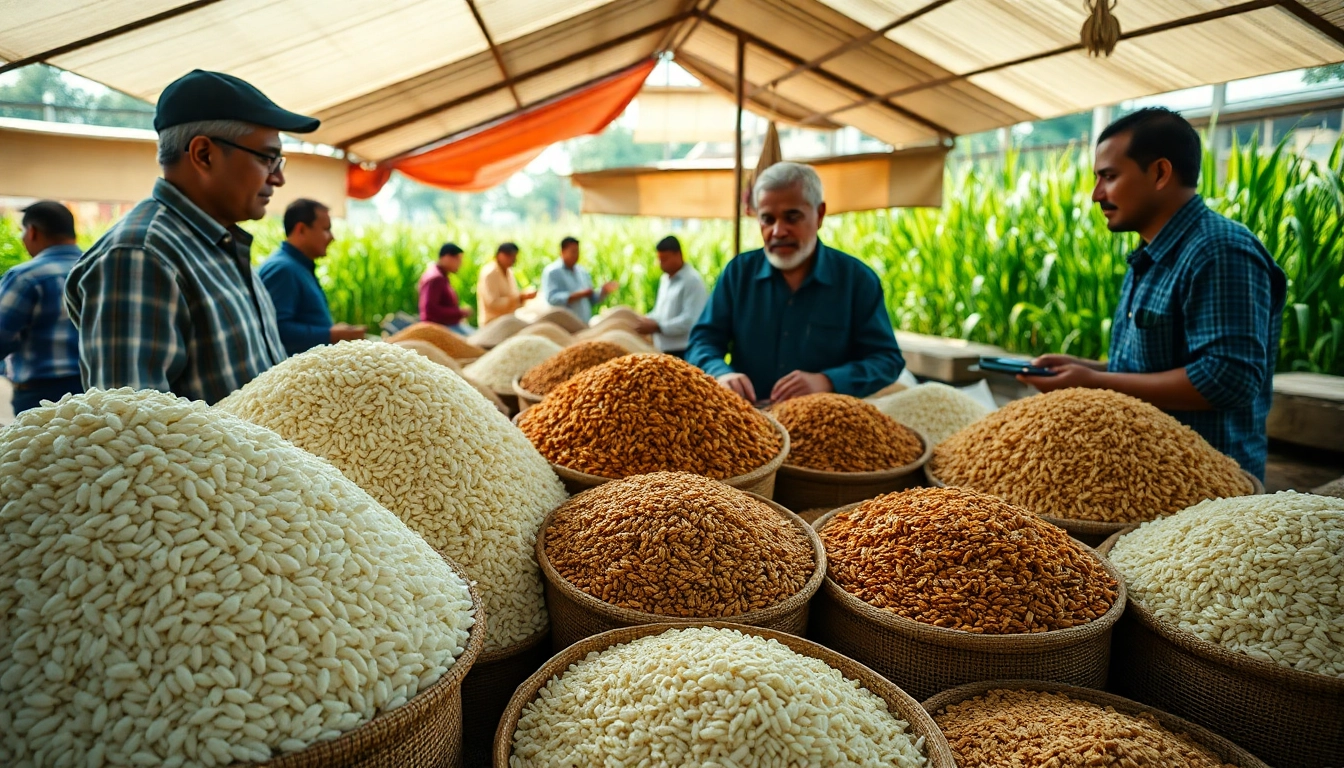
Understanding the Role of Rice Buyers in the Market
The global rice market plays a crucial role in the economy of many countries, accounting for a significant portion of agricultural exports. As a staple food for more than half of the world’s population, rice is not just a commodity; it is essential for food security and economic stability. Within this dynamic landscape, rice buyers occupy a pivotal position. They facilitate trade by connecting suppliers with consumers, influencing market trends and dynamics significantly.
Who are Rice Buyers?
Rice buyers encompass a diverse group of entities engaged in the procurement of rice for various purposes. This category includes wholesalers, retailers, importers, and distributors, who purchase rice in bulk for resale or processing. Often, rice buyers operate at different scales, ranging from large multinational corporations involved in international trade to small local businesses sourcing rice from regional farmers.
Understanding the profile of rice buyers is essential. Generally, they fall into two main categories: commercial and institutional buyers. Commercial buyers are primarily focused on profit maximization, often seeking the best prices and quality to meet consumer demands. In contrast, institutional buyers like schools or government agencies are more concerned about reliability and compliance with nutrition standards.
The Importance of Connections for Rice Buyers
Connections are paramount for any rice buyer. Establishing rapport with suppliers, producers, and distributors allows buyers to negotiate better pricing, foster trust, and enhance the sustainability of their supply chains. Attending trade shows, participating in industry conferences, and engaging in local agricultural fairs can help buyers build these essential relationships.
In essence, networks can provide rice buyers with critical insights into market trends, pricing fluctuations, and even emerging consumer preferences. Leveraging these connections enables buyers to anticipate market changes and make informed purchasing decisions.
Market Trends Impacting Rice Buyers
Several market trends have been shaping the rice industry, particularly impacting rice buyers. One significant trend is the increasing demand for specialty rice, such as organic and basmati rice. This demand shift compels buyers to not only acquire standard rice types but also diversify their offerings to include these sought-after varieties.
Moreover, globalization has introduced new dynamics, allowing buyers to access a broader range of suppliers from various countries. This trend has made it possible for buyers to source rice from the best producers, thereby improving quality and pricing. However, it also increases competition, pushing rice buyers to enhance their operational efficiency and marketing strategies.
Finding Reliable Rice Buyers
Finding reliable rice buyers is a challenge that many suppliers face. Ensuring that buyers are trustworthy and have a genuine demand for rice is critical for building long-term partnerships. Fortunately, there are several approaches to identify and connect with reliable rice buyers.
Utilizing Online Platforms for Rice Buyers
In today’s digital age, leveraging online platforms is one of the most effective methods for both rice buyers and sellers. Websites dedicated to B2B trade, such as TradeWheel or go4WorldBusiness, provide extensive databases of potential buyers actively seeking rice. These platforms facilitate communication and negotiations by allowing sellers to showcase product listings and receive inquiries.
Additionally, social media plays a role in connecting suppliers with rice buyers. Platforms like LinkedIn allow businesses to market themselves, share their achievements, and find potential partners by engaging in industry-related discussions and networking opportunities.
Traditional Methods to Connect with Rice Buyers
While online strategies are pivotal, traditional methods still hold value in finding reliable rice buyers. Participating in trade fairs and exhibitions is an excellent way for suppliers to meet potential buyers face-to-face, establishing personal relationships that can last for years.
Direct outreach via cold calling or email pitching can also be effective, though more time-consuming. Suppliers should ensure they have a solid value proposition before reaching out and be ready to answer questions about their products and services comprehensively.
Evaluating Potential Rice Buyers’ Credibility
Before committing to a business relationship, it’s essential for suppliers to evaluate the credibility of potential rice buyers. Various metrics can be used, including the buyer’s financial stability, market reputation, and history of transactions. Conducting a background check and looking for reviews or testimonials from other suppliers can provide insights into the buyer’s reliability.
Additionally, participating in industry associations and trade groups can help suppliers verify the legitimacy of buyers. Membership in these organizations often indicates that buyers adhere to industry standards and best practices, decreasing the risk for suppliers.
Challenges Faced by Rice Buyers Today
Despite their vital role in the rice supply chain, rice buyers encounter multiple challenges in today’s dynamic market. Understanding these challenges is crucial for both buyers and suppliers to develop strategies that promote synergy and productive negotiations.
Market Fluctuations Affecting Rice Buyers
The rice market is susceptible to various economic factors, including fluctuating prices driven by changes in supply and demand dynamics. For instance, adverse weather conditions can impact crops, leading to reduced supply and potential price increases. Rice buyers must remain vigilant, as unanticipated fluctuations can erode profit margins significantly.
To mitigate this risk, buyers often employ financial strategies such as hedging or purchasing futures contracts to safeguard against volatile price spikes. However, these strategies necessitate a high level of market intelligence and analysis.
Competition Among Rice Buyers
As globalization opens up new trade routes, competition among rice buyers has intensified. Buyers now face the challenge of not only procuring rice at the best prices but also differentiating themselves from other buyers in the market. This increased competition can lead to aggressive pricing tactics that hurt profitability.
To combat this, buyers must enhance their value propositions, focusing on aspects such as service reliability, quality control, and unique offerings to stand out. More importantly, fostering strong relationships with suppliers can provide buyers with negotiating power and priority access to high-quality stocks.
Regulatory Challenges for International Rice Buyers
International trade in rice is also governed by a barrage of regulations that vary from country to country. Compliance with customs regulations, tariffs, import/export restrictions, and food safety standards can be daunting for rice buyers, impacting their operational efficiencies.
Acquiring legal counsel or consulting industry experts can help buyers navigate these complexities. Staying informed about regulatory changes and forming partnerships with reliable logistics companies can also streamline operations and minimize compliance risks.
Effective Strategies for Rice Buyers to Succeed
To thrive in a competitive global market, rice buyers need strategic approaches that prioritize relationship building, market understanding, and negotiation prowess. By adopting these strategies, buyers can position themselves favorably against competitors.
Building Long-term Relationships as Rice Buyers
Long-term relationships with suppliers can be incredibly beneficial for rice buyers. These partnerships often lead to better pricing and priority access to high-quality products during times of high demand or supply shortages. To build these relationships, buyers should engage in regular communication, demonstrate key promises, and follow through on commitments.
Additionally, providing feedback to suppliers can help them improve their offerings and services, creating a win-win scenario that strengthens the partnership over time.
Leveraging Trade Shows for Rice Buyers
Trade shows serve as powerful platforms for rice buyers to connect with suppliers, gain insights into market trends, and learn about new products or innovations. By attending these events, buyers can engage in valuable face-to-face discussions, enabling them to establish relationships more effectively than through digital communication alone.
Moreover, trade shows often host workshops and educational sessions where buyers can deepen their knowledge of the industry and discover emerging trends that may impact their buying strategies.
Negotiation Techniques for Rice Buyers
Effective negotiation plays a crucial role in securing favorable terms for rice buyers. Buyers should enter negotiations well-prepared with relevant market data and a clear understanding of their needs and objectives. Establishing a collaborative atmosphere can also lead to more favorable outcomes for both parties.
Employing principled negotiation techniques, which focus on interests rather than positions, can help buyers gain a more significant share of value in deals while maintaining amicable relationships with suppliers. Factors such as flexibility in payment terms, quantities, and delivery schedules can provide leverage during negotiations.
Future of Rice Buyers in Global Trade
The rice market is poised for transformation due to technological advancements, shifting consumer behaviors, and environmental considerations. Understanding these trends will be crucial for rice buyers looking to thrive in the evolving landscape.
How Technology is Shaping Rice Buyers’ Processes
Technology is revolutionizing how rice buyers operate, from online platforms that facilitate connections with suppliers to software that aids in managing inventory and supply chains. The rise of artificial intelligence and machine learning is enabling buyers to analyze market data more efficiently, leading to better purchasing decisions.
Moreover, blockchain technology is enhancing traceability and transparency in the supply chain, allowing buyers to ensure product quality and compliance with regulations.
Emerging Markets for Rice Buyers
As consumer preferences continue to evolve, new markets are emerging for rice buyers. Regions like Africa and Southeast Asia are experiencing rising populations and shifting dietary preferences, increasing demand for rice. Buyers seeking to expand their market reach should consider these emerging opportunities while remaining attentive to local cultural practices and consumption trends.
Adapting to Sustainability as Rice Buyers
Environmental sustainability has become a pressing concern in all industries, including agriculture. Rice buyers are increasingly being called upon to source rice sustainably to meet consumer demand for eco-friendly products. This shift necessitates collaboration with suppliers who adhere to sustainable farming practices and certification programs.
Incorporating sustainability into purchasing strategies not only fulfills consumer expectations but can also lead to competitive advantages as more consumers prioritize environmentally-conscious choices.





